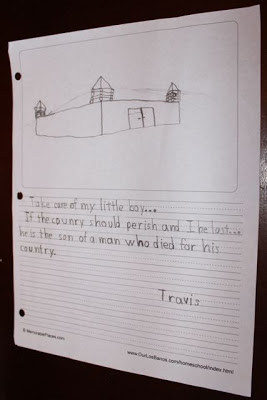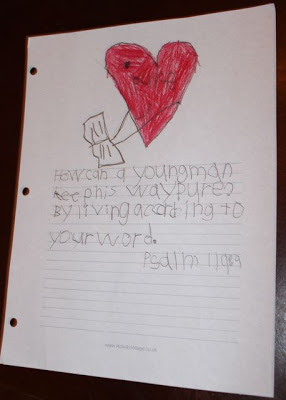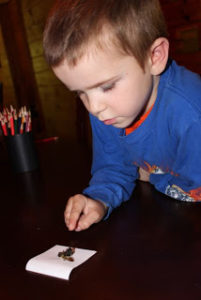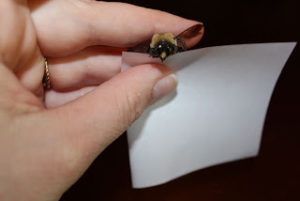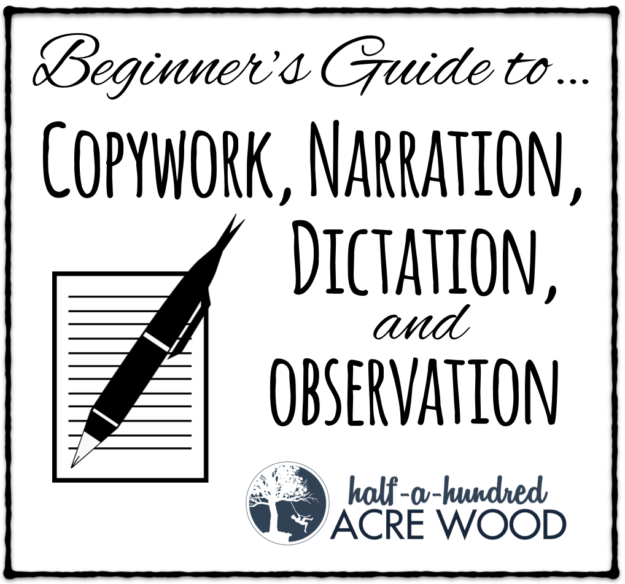
Copywork, Dictation, Narration, and Observation are three tools we are learning to use for:
- Listening and paying attention to details
- Imitating the “masters” of poetry, writing, and storytelling
- Learning punctuation, capitalization, sentence structure and parts of speech. If done well and consistently, copywork and dictation are a fantastic foundation for English grammar in the early elementary grades (K-3).
- Learning about the world around us (nature study, science experiments, math connections…)
Because it was easier for me to read about copywork, dictation, and narration than it was to actually implement it (for I am a visual learner who usually needs diagrams or photos in order to implement something), I wanted to provide a short description of each with a few photos for the other visual learners out there.
Copywork
Copywork: The act of writing down, word for word, a selection from another source. The goal is excellent handwriting, accurate punctuation and capitalization, and [afterwards] discussion of sentence structure [as appropriate for the child’s learning level].
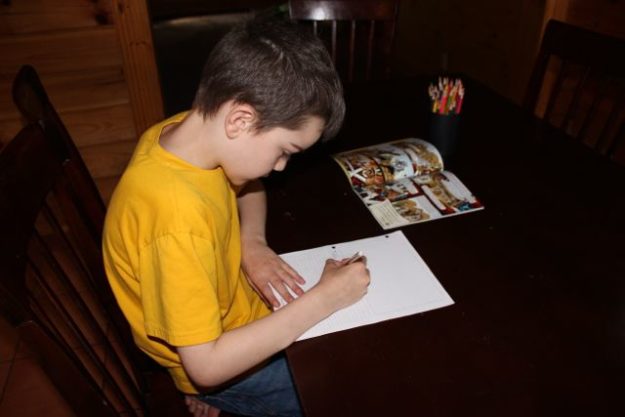
Above: Copying a quote from a favorite history comic book. {Graphic History’s The Battle of the Alamo}
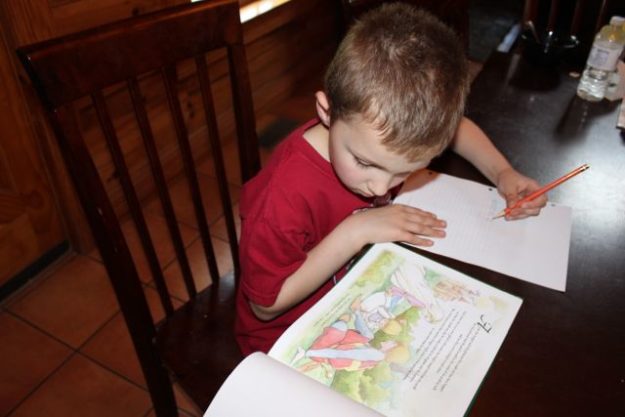
Above: Copying scripture referenced in a favorite picture book {The Scroll and the Squire}
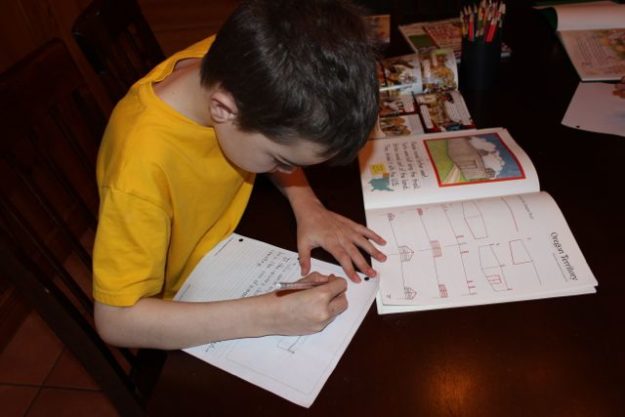
Above: Drawing a fort from one of our favorite drawing resources, Draw Write Now {Book 5}
Dictation
Dictation: The act of writing words or sentences that are stated out loud by another person.
There are no pictures for this because it looks like the above, except there is no external source they are referencing outside of the words that are being spoken aloud.
How to use dictation for the first part of Psalm 119:9:
- Teacher says: How can a young man keep his way pure?
- Student repeats: How can a young man keep his way pure?
- Teacher says: Write How can a young man keep his way pure?
- Student writes: How can a young man keep his way pure?
- Teacher reminds student: Is there anything special you need to remember in this sentence? {Special punctuation or capitalization, etc.}
- Student self-checks work.
- Teacher spells the entire sentence out loud, including punctuation, so that the child can check their work and make corrections: Check and correct your sentence: Capital h-o-w, How, c-a-n, can, a, a, y-o-u-n-g, young, m-a-n, man, k-e-e-p, keep, h-i-s, his, w-a-y, way, p-u-r-e, pure, question mark.
It is best to select sentences that contain spelling words previously tested as a review. You will also want to select only one sentence structure or punctuation concept at a time, and move on to another after that concept is mastered completely. (e.g., focus on end marks one week, addressing one type of sentence at a time; move on to commas after interjections, etc.) Some spelling programs include dictation exercises to review spelling concepts – and these dictation sentences can also be used to practice proper punctuation, capitalization, and sentence structure. (This is one reason why we use and love All About Spelling!)
Narration
Narration (oral or written narration): The act of telling back something that the reader read or something that was read to him/her.
Narration can be tough! It requires excellent listening skills. We currently are using Window on the World and The Story of the World as our primary narration books, but you can use ANYTHING.
For younger students (or those doing this for the first time), start with one or two sentences. They do not have to retell it word-for-word, but they need to be able to summarize the major concepts, including any necessary details. If the student has trouble with this, ask questions to prompt them, or allow another child to “add what they remember.” Eventually, you [or they] will read and have them narrate a paragraph… and then a page… and then a chapter…. and, finally, an entire book. When they get to this point, their narration should include the main characters, setting, conflict, plot, climax, resolution, and theme.
Make narration fun for the creative learners:
- Let them dress up as a king to narrate the life of a person… like King Solomon.
- Put on a puppet show detailing a story from history.
- Sing the narration.
- Allow the child to “teach” the class at the whiteboard by drawing simple pictures as they narrate.
- For written narration, you can use lapbooking templates. Visit this post for more on how to do that.
- Let your child write his or her own version of a book.
- Videotape your children doing this and watch it together as a family. {Videotaping is a good way for older children to watch their presentations and improve upon their presentation skills, too!}
- What other ways have you made narration enjoyable? Please leave a comment for us!
Possible resources to use for Copywork, Dictation, and Narration:
- The Bible
- Literature
- Poetry
- Hymns
- Famous speeches and quotes
- Memory work
- Story of the World or other read-aloud books
For children who would rather play in forts all day:
- Favorite Bible stories
- Storybooks
- Fairytales or Fables
- Comic books
- Newspaper or magazine articles (LEGO magazine?)
- Let them choose whatever they enjoy!
We used narration quite a bit for our IEW writing assignments, since our oldest has trouble with coming up with words [creative writing] while also focusing on good handwriting (or typing) and punctuation, etc. Many children have trouble focusing on more than one task at a time before age 10 (and sometimes before age 14). If your child is being asked to write creatively [come up with his own words], it is not necessary to analyze punctuation, for instance. In the early years, you can separate each step and allow them to correct their written work on a different day or as a separate activity. Forcing them to complete these tasks all together [at the same time] before they enter the middle school years may cause them to totally dislike writing altogether.
Observation
Observation: The act of asking questions and making & recording observations about the nature of things. {I do not have photos of recorded observations (or drawings), but at least you can see us making observations below.}
Great for Mathematics:
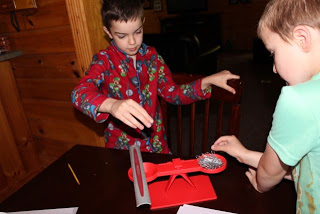
Above: How many paperclips does it take to balance our ruler?
Great for Science:
Yep, my friends. It is Bee Battle time at Half-a-Hundred Acre Wood. It’s time to repair and exterminate, as much as I hate to kill these hard-working mama bees. For more about Carpenter Bees (mighty fascinating creatures!) and observations via nature studies on specific critters or plants, visit our Nature Study page.

